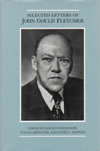
BH. John Gould Fletcher
 |
22. Selected Letters of John Gould Fletcher. Edited by Leighton Rudolph, Lucas Carpenter, and Ethel Simpson. John Gould Fletcher Series, vol. 7. Fayetteville: U of Arkansas P, 1996.
a. To Gerald Sanders, 23 October 1942. Fletcher complains to the editor of Chief Modern Poets of England and America that the new edition will include seven poems from Japanese Prints (7) ‘when one or two would have done’. Fletcher now believes the poems in that collection are ‘simply amusing trifles’ and ‘work of secondary intensity’.
b. To Scott Greer, 17 January 1944. In assessing his own work Fletcher again dismisses the importance of Japanese Prints: it ‘wasn’t an important book at all; just little scraps’.
c. To Earl Miner, 27 January 1950. Fletcher recalls that in the early years of the century he read haiku in translations by Hearn (see D9) and Chamberlain (D5), and in German and French, and notes as well that he was ‘influenced’ by Noguchi (D15); includes passing reference to the Japanese interests of Flint (Ap), Lowell, and Pound, along with Yasuda’s Pepper-Pod (see 17) and Harold G. Henderson’s Bamboo Broom (Boston: Houghton Mifflin, 1934). The German and French translations Fletcher read would most likely have been those by Florenz (see D11) and Revon (see D21).
d. To Miner, 24 February 1950. Fletcher believes that the influence of haiku on the Imagist poets ‘was much more considerable than almost anyone has suspected’, for it ‘helped . . . make their poems short, concise, [and] full of direct feeling for nature’. Includes passing reference to Waley (see D26), Yeats’s adaptations from the nô, Lowell’s Twenty-Four Hokku on a Modern Theme (BI11), and Fletcher’s friendship with Yasuda (see 17), with whom he corresponds ‘frequently’.

